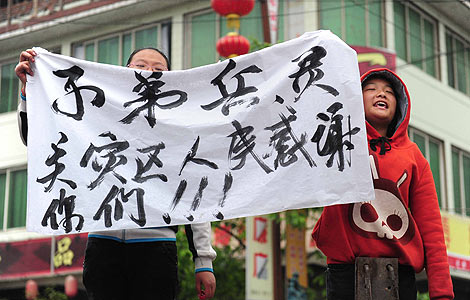Shrine visits offensive
Updated: 2013-04-24 08:00
(China Daily)
|
||||||||
The Yasukuni Shrine is notorious as a symbol of Japan's militarist past.
Japanese politicians know this. Not least because each time they go there, they are angrily condemned by those countries that suffered from Japan's brutal imperialism.
The latest visits have not only demonstrated Tokyo's lack of remorse for its militaristic past, they have also sent a defiant message that Japan does not care how international law works or how its neighbors feel.
On Tuesday morning, 169 Japanese lawmakers visited the Yasukuni Shrine, which honors Japan's war dead, including 14 class-A World War II criminals, the largest collective visit by Japanese politicians to the shrine since 2005. Their visit followed a weekend offering made by Japanese Prime Minister Shinzo Abe and visits by three cabinet ministers, including Taro Aso, Japan's deputy prime minister.
Any pilgrimage made by Japanese officials to a place that enshrines war criminals casts salt on the wounds of neighboring nations.
The visits came amid lingering tensions between Japan and Asian victims of its wartime invasions, such as China and the Republic of Korea. The continuing visits to the Yasukuni Shrine by Japanese politicians show they still refuse to face up squarely to their country's past crimes, and this is a major reason Japan has failed to win the trust of other countries in Asia.
Following the weekend actions by Abe and his cabinet members, the ROK expressed "deep concern and regret" and cancelled its foreign minister's trip to Japan. China also denounced the move which should alarm the international community.
The officials' worship of Japan's military past has also fanned rightist sentiment in Japan. A flotilla of 10 boats carrying about 80 Japanese nationalist activists sailed into waters around China's Diaoyu Islands early on Tuesday. Although driven away by China's maritime surveillance vessels patrolling the waters around the islands, the boats infringed on China's sovereignty.
Japan has expressed a willingness to improve ties with Beijing, but its continual provocations show there is no sincerity in those words. Japan cannot expect to win the trust or respect of its neighbors when its words and actions show it lacks any contrition about its past.
(China Daily 04/24/2013 page8)

 Children gathered together as healing process begins
Children gathered together as healing process begins
 Fears surface after hippo kills tourist from Shanghai
Fears surface after hippo kills tourist from Shanghai
 Rescuers win people’s hearts
Rescuers win people’s hearts
 Law to curb tourism price hikes
Law to curb tourism price hikes
 House damaged, life continues in Sichuan
House damaged, life continues in Sichuan
 Relief reaches isolated village
Relief reaches isolated village
 Rainfall poses new threats to quake-hit region
Rainfall poses new threats to quake-hit region
 Funerals begin for Boston bombing victims
Funerals begin for Boston bombing victims
Most Viewed
Editor's Picks

|

|

|

|

|

|
Today's Top News
Industry faces recovery fight
China's 2nd aircraft carrier will be 'larger'
China thanks countries
for quake relief aid
China, US to enhance mutual trust
Beijing protests Diaoyu incident
Copyrights take a bite out of Apple
Four new H7N9 cases
Landslide kills 9 in SW China
US Weekly

|

|






